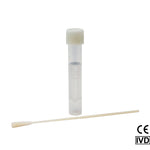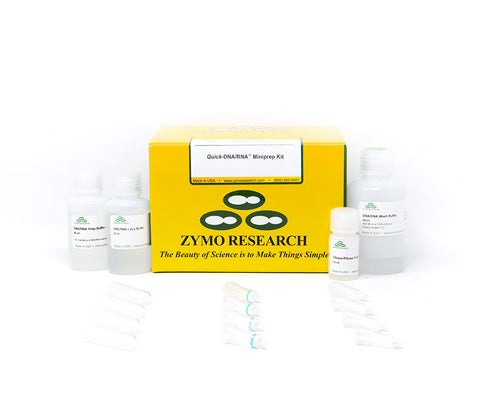Successfully Added to Cart
Customers also bought...
-
 DNA/RNA Shield (50 ml)Cat#: R1100-50DNA/RNA Shield reagent is a DNA and RNA stabilization solution for nucleic acids in any biological sample. This DNA and RNA stabilization solution preserves the...
DNA/RNA Shield (50 ml)Cat#: R1100-50DNA/RNA Shield reagent is a DNA and RNA stabilization solution for nucleic acids in any biological sample. This DNA and RNA stabilization solution preserves the... -
 DNA/RNA Shield SafeCollect Swab Collection Kit, 1ml (1 collection kit)Cat#: R1160The DNA/RNA Shield SafeCollect Swab Collection Kit is a user-friendly collection kit for stabilizing the nucleic acid content of samples collected with a swab. DNA/RNA Shield completely inactivates harmful pathogens...
DNA/RNA Shield SafeCollect Swab Collection Kit, 1ml (1 collection kit)Cat#: R1160The DNA/RNA Shield SafeCollect Swab Collection Kit is a user-friendly collection kit for stabilizing the nucleic acid content of samples collected with a swab. DNA/RNA Shield completely inactivates harmful pathogens...

Quick-DNA/RNA Miniprep

| Cat # | Name | Size | Price | Quantity |
|---|
Highlights
- Quick & Easy: Extract DNA and RNA from cells, small amounts of easy-to-lyse tissue, buffy coat, buccal cells, plasma, serum, and other biological liquids. Not compatible with whole blood.
- Ultra-Pure: Ready for Next-generation sequencing, RT-qPCR, arrays, etc. DNase I included (Plus kit and MagBead only)
Documents
Product Description
Technical Specifications
| Equipment | Microcentrifuge, vortex |
|---|---|
| Purity | DNA and RNA is ready for Next-Gen sequencing, RTPCR, microarray, hybridization, etc. A260/A280, A260/A230: >1.8. |
| Sample Source | Cells, small amounts of easy-to-lyse tissue, buffy coat, buccal cells, plasma, serum, and other biological liquids. Not compatible with whole blood. |
| Size Range | Genomic DNA ≥40 kb and Total RNA ≥17 nt |
| Yield | 100 µg DNA and 50 µg RNA (binding capacity) in ≥50 µl and ≥25 µl (elution volume), respectively |
Resources
Q1: What is the difference between the Quick-DNA/RNA Miniprep (D7001) and Quick-DNA/RNA Miniprep Plus (D7003)?
Use the Quick-DNA/RNA Miniprep for cells and soft tissues. The “Plus” kit accommodates all sample types (cells, tissue, blood) and comes with DNA/RNA Shield (sample collection, transport, storage at ambient temperature).
Q2: Is DNase I available for individual purchase?
Yes, the catalog number for the DNase I set (DNase and DNA Digestion Buffer) that we offer is E1010.
Q3: Can I use other DNase I enzymes (or sets)? (e.g. Qiagen DNase I)?
The kit is optimized with Zymo’s DNase, however DNase from other manufacturers can be used. Follow the respective protocol for on-column DNase treatment. If the DNase does not have a protocol, proceed with in-tube DNase treatment post extraction, then purification using either “Reaction Clean-up procedure” or RCC-5.
Q4: How to store DNase-I following resuspension?
Lyophilized DNase I is stable at room temperature. Once resuspended, store frozen aliquots. Minimize freeze thaw cycles as much as possible. Freeze thaw will lower DNase activity.
Q5: Is Quick-DNA/RNA suitable for very small numbers of cells?
Yes, the Quick-DNA/RNA MicroPrep Plus (#D7005) is designed and capable of purifying RNA down to single cell inputs (picogram amounts). A sensitive quantification method is needed (e.g. Qubit, qPCR, etc.)
Q6: Is the kit compatible with blood samples stored in PAXgene Blood Tubes?
Yes, the kit is compatible with these anticoagulants.
Q7: Is the DNase-I treatment necessary?
If the downstream application requires DNA-free RNA, we recommend performing the DNase I treatment.
Q8: How to purify RNA from samples stored in RNAlater?
It is best to remove the RNAlater as it can interfere with the purification process: - For cells: Pellet via centrifugation at up to 5,000 x g and remove RNAlater (supernatant) - For tissue: Remove tissue using forceps, eliminate any excess reagent or crystals (e.g. PBS rinse) and proceed with addition of RNA Lysis Buffer. If RNAlater cannot be removed, add 1 volume of RNase-free water or PBS (1:1), then add 4 volumes DNA/RNA Lysis Buffer (4:1).
Q9: Is it possible to extract proteins with the Quick-DNA/RNA kit?
Yes, proteins can be Acetone Precipitated post RNA binding step. Please request supplementary protocol from Zymo Research Technical Support.
Q10: I ran out of DNA/RNA Wash Buffer. Can I use something else?
Yes. Use 80% ethanol as a substitute. DNA/RNA Wash Buffer is also sold separately.
Q11: Is the DNA and RNA suitable for Next-Gen Sequencing or other sensitive downstream applications?
Yes, both DNA and RNA is high quality (A260/A280 >1.8, A260/A230 >1.8) and suitable for any downstream application, including NGS, qPCR, etc.
Q12: Will the kit isolate small RNAs?
Yes, this kit will isolate small/micro RNA’s ≥ 17 nucleotides.
Q13: Can samples be stored in DNA/RNA Lysis Buffer prior to processing?
Yes, samples in DNA/RNA Lysis Buffer are stable overnight at room temperature and can be stored frozen (-80°C). Be sure to lyse and homogenize the sample well prior to freezing. Bring the sample to room temperature prior to RNA Purification.
Q14: Is the kit compatible with samples stored in DNA/RNA Shield?
Yes, bring samples homogenized and stored in DNA/RNA Shield to room temperature (20-30ºC). Add 1 volume of DNA/RNA Lysis Buffer (1:1) and mix well. Proceed with DNA Purification.
Q15: How should I proceed with this kit if my sample is in RNAlater™?
Cells - Pellet by centrifugation at up to 5,000 x g and remove RNAlater™ (supernatant). Proceed to Sample Preparation, see protocol.
Tissue - Transfer into a new tube with forceps and remove any excess RNAlater™. Proceed to Sample Preparation, see protocol.
Alternatively, for liquid samples from which RNAlater™ cannot be removed, add 1 volume of nuclease-free water (or PBS) to 1 volume liquid sample (1:1) and mix. Then add 4 volumes DNA/RNA Lysis Buffer to 1 volume sample/water (or PBS) mixture (4:1). Mix again and proceed to Total RNA Purification, see protocol.
Q16: Can I still use DNA/RNA Shield if a precipitate has formed?
This can happen on occasion due to transport or storage at lower temperatures. The reagent functionality is not affected; however, the precipitate can be resolved by heating the reagent to >37 °C.
| Cat # | Name | Size | Price | |
|---|---|---|---|---|
| W1001-10 | DNase/RNase-Free Water | 10 ml | $21.50 | |
| C1006-50-F | Spin-Away Filters | 50 Pack | $62.30 | |
| C1001-50 | Collection Tubes | 50 Pack | $17.00 | |
| D7010-2-50 | DNA/RNA Prep Buffer | 50 ml | $71.40 | |
| D7001-1-50 | DNA/RNA Lysis Buffer | 50 ml | $89.50 | |
| D7010-3-24 | DNA/RNA Wash Buffer (Concentrate) | 24 ml | $68.00 | |
| C1078-50 | Zymo-Spin IICR Columns | 50 Pack | $62.30 | |
“This kit was invaluable. I was able to get at least 1 µg of RNA and several hundred nanograms of DNA from each sample - all of it high quality. Much better than my previous experience with a different dual DNA/RNA isolation kit.”
- Julie P. (CU Anschutz Medical Campus)
“I usually recommend this kit for those who want to extract both DNA and RNA from a single sample. We have even had great quality and yield for single insect samples.”
- Robert B. (Harvard University)
"The kit is very economical for simultaneous extraction of high quality DNA and RNA from very small amount of biological samples. More particularly, RNA is of good quality that suits best for applications like next-generation sequencing (RNA-Seq)."
- Muhammad A. (Northwestern University)
Need help? Contact Us

